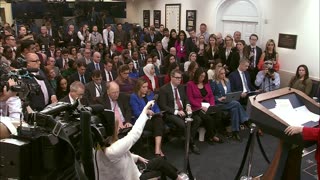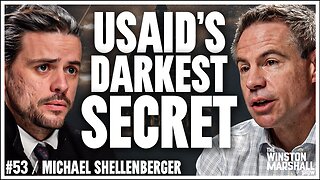Premium Only Content

The Cost of Legalistic Leadership | 1 Samuel 14:31-35
Has legalistic leadership adversely affected you?
Welcome to the Daily Devo. I am Vince Miller.
This week, we are in 1 Samuel 14. I've titled this chapter "A Contrast Of Leadership Between Jonathan and Saul."
In the first part of Chapter 14, we witness Jonathan, who acted in faith, and God did some incredible things through him. In the second part of Chapter 14, Saul engages in and flubs up a really great thing that God had been doing. Saul cuts off the priest, who is in the middle of his duties because he sees the chaos in the enemy camp. So they head off in hot pursuit. But before they go, Saul makes the people swear an oath not to eat until his enemy is defeated.
We saw last time this was an unnecessary oath promoted from self-interest, and his son Jonathan knows it. Now the people are weak, and here is what happens in 31-35:
They struck down the Philistines that day from Michmash to Aijalon. And the people were very faint. The people pounced on the spoil and took sheep and oxen and calves and slaughtered them on the ground. And the people ate them with the blood. Then they told Saul, “Behold, the people are sinning against the Lord by eating with the blood.” And he said, “You have dealt treacherously; roll a great stone to me here.” And Saul said, “Disperse yourselves among the people and say to them, ‘Let every man bring his ox or his sheep and slaughter them here and eat, and do not sin against the Lord by eating with the blood.’” So every one of the people brought his ox with him that night and they slaughtered them there. And Saul built an altar to the Lord; it was the first altar that he built to the Lord. — 1 Samuel 14:31-35
Let me say here that it sounds like they were eating raw flesh, like cannibals. But they are not. They simply had not allowed all the blood to drain from the animal before they cooked it. They were starving, so it led them to rush and sin.
We have all encountered a moment like this. We have all been so hungry or waited so long to eat that when we are sat before a buffet, we cannot stop eating. Plenty of times, I have been so hungry that I have eaten an entire family-size bag of chips. There have been times I have waited so long for a meal that when food is finally in front of me, I eat too fast and beyond my capacity, to the point I cannot move. When you sit excessive amounts of food before hungry and exhausted men, we should expect them to rush and overeat.
That's what happened here. The people were tired and hungry. They now had excessive food and rushed into an act of sin. But Saul led them into this unnecessary sin and blamed them for it.
This is terrible leadership. Saul ruined a great story and a great moment. Had he not mandated this vow, think about how awesome this story would have ended. Jonathan and his armor-bearer sneak away. They take steps of courageous faith. They seek God. They climb a cliff into battle. Two men slaughter twenty men. Then, the Hebrew turncoats in the Philistine ranks turn on the garrison. Then, outside tribes join in from every direction. Saul sees the commotion and hustles over. Even in the moment of need, God provides some natural provision in the form of honey for a last push in battle. And finally, there is a complete defeat and plunder. Six hundred men defeat 36,000 men and send them running, but the whole story is ruined by an oppressive and selfish vow that should have never been issued, and then Saul blames his men for rushing to eat.
Legalistic leaders forbid freedoms that God grants.
They forbid freedom to control situations, people, and outcomes. However, sometimes, these restrictions backfire, tempting people to break with legalism and do things God forbids. This is exactly what Saul did here. His vow led the people into sin. Even worse, Saul doesn't take ownership of the policy that led his people into sin. He blames them. Saul played god, thus ruining a great moment where God did something great.
One tension in leadership is knowing how to best lead a person or people to victory. Some only need to know the goal, others need tangible steps, and still others need protective boundaries. It is different for everyone. But as leaders, we have to make sure our attitude and heart are in the right place as we make these decisions. Saul instituted his vow out of selfish intent. He wasn't concerned about God or his victory. He was only worried about himself, his image, and his victory over "his enemy" (1 Samuel 14:24).
If you lead one or many, pay attention to your heart today. There may be one who is challenging for you to lead. Be careful how you speak and lead them. Let the Spirit have control, and stop being purposely oppressive or passively aggressive. If you do, your legalistic plan might backfire and draw unneeded attention to your selfishness and sin.
#LeadershipLessons, #FaithOverLegalism, #AvoidLegalism
Ask This:
In what areas of your life or leadership have you found yourself imposing unnecessary restrictions or rules? How can you lead with more grace and trust in God's guidance instead?
Reflect on a time when legalistic attitudes caused more harm than good. How can you ensure your leadership fosters freedom in Christ rather than restrictive control?
Do This:
Watch your legalistic tendencies in leadership.
Pray This:
Lord, help me to lead with humility and grace, avoiding the pitfalls of legalism that stem from selfish motives. Guide my heart to prioritize Your will over my own, trusting You in every decision I make. Amen.
Play This:
Yet Not I But Through Christ In Me.
-
 3:14
3:14
Through the Bible with Vince Miller
1 day ago $0.01 earnedThe Comparison Trap: Why It’s Stealing Your Joy | Ecclesiastes 4:4
371 -
 LIVE
LIVE
The White House
1 hour agoPress Secretary Karoline Leavitt Briefs Members of the Media, Feb. 25, 2025
5,510 watching -
 LIVE
LIVE
The Quartering
1 hour agoDan Crenshaw Hot Mic Threat, Jake Paul Endorses Vivek, and Kathleen Kennedy Leaves Lucasfilm
3,013 watching -
 1:34:46
1:34:46
Russell Brand
1 hour agoControl Slipping: Germany’s Vote, Ukraine, Apple, and Joy Reid – SF543
22.4K13 -
 57:44
57:44
Winston Marshall
1 hour ago“They Were Hiding THIS!” Michael Shellenberger UNCOVERS Dark Secret About USAID and The Deep State
2.01K2 -
 50:59
50:59
Michael Franzese
1 day agoAmerica’s Biggest Issues EXPOSED by Tomi Lahren
19.9K9 -
 LIVE
LIVE
The Dana Show with Dana Loesch
1 hour agoDOGE LAYOFFS FACE BACKLASH | The Dana Show LIVE On Rumble!
467 watching -
 1:25:40
1:25:40
Bare Knuckle Fighting Championship
1 day agoThe Bare Knuckle Show with Brian Soscia
1.62K -
 LIVE
LIVE
TheAlecLaceShow
2 hours agoDan Bongino Joins Kash Patel at FBI | Vivek For Ohio | Where’s the Epstein List | The Alec Lace Show
152 watching -
 55:46
55:46
The Dan Bongino Show
4 hours agoChange Is Coming, And All The Right People Are Panicking (Ep. 2430) - 02/25/2025
666K1.73K